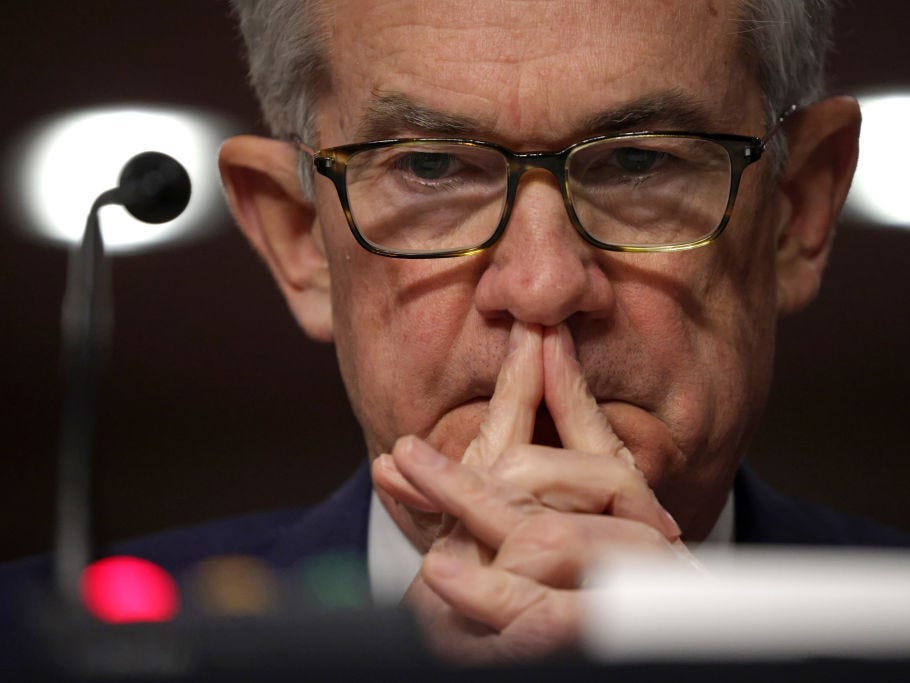- US futures and European shares rallied on Thursday, recouping some of the previous day's losses sparked by hawkish Fed speakers.
- Treasury yields eased on Thursday but were still at their highest in three years.
- Oil prices jumped on Thursday as markets anticipate more sanctions on Russia from Western governments.
US stock futures and European shares rallied on Thursday, paring some of the previous day's losses that ensued from evidence that Federal Reserve policymakers are committed to tackling inflation, even if that means raising rates aggressively and hurting the equity market.
Minutes from the Fed's most recent policy meeting, at which it raised interest rates, showed officials were mostly in favor of a half-point rate hike last month, as well as a rapid shrinking of the central bank's bloated balance sheet — both of which would tighten monetary policy more quickly.
The benchmark stock indices slid by over 2%, while bond yields surged after the minutes were released, as investors took the view that the Fed will be a lot more aggressive than previously expected. Former Fed President William Dudley even suggested policymakers will have to target the stock market to rein in inflation.
"One thing is certain: To be effective, [The Fed] will have to inflict more losses on stock and bond investors than it has so far," Dudley said in an opinion piece for Bloomberg.
By Thursday, S&P 500 futures were up 0.3% while Nasdaq 100 futures rose 0.5% and Dow Jones futures were up 0.2%, indicating a steadier start to trade later.
"The minutes also show that Fed officials are becoming increasingly alarmed at how inflationary pressures are increasing and are determined to send a message to markets that they will act decisively to keep it in check," Michael Hewson, Chief Market Analyst at CMC Markets UK wrote.
Richmond Fed President Thomas Barkin told the Central Maryland Chamber seperately on Wednesday that the Fed could certainly increase interest rates by 50 basis points again if it were neccessary to prevent inflation expectations from "unanchoring."
Elsewhere, in Europe the Stoxx 600 index rose 0.63% in early trading Thursday, while overnight in Asia, China's CSI 300 slipped 1.28% and Tokyo's Nikkei 225 fell 1.69%.
Reflecting some of the alarm among investors about the outlook for US rates, 10-year Treasury yields hit three-year highs on Wednesday, rising by as much as 10 basis points at one point in the day. By Thursday, yields retreated, falling 3 basis points on the day to around 2.58%.
"10-year Treasuries should not jump around in ranges of 10 basis points a day, though since the start of March this has been the norm, with the market only trading in a tighter range on five days over that time period. Great for traders, a nightmare for strategists – including this one," Michael Brown, head of market intelligence at Caxton, wrote.
In commodities, Brent crude futures rose 1.21% to trade at $102.28 a barrel, while West Texas Intermediate gained 1.14% to trade at about $97.27 a barrel, after falling below $100 on Wednesday. The West is still considering more sanctions on Russia that could target its massive energy sector. The UK said on Wednesday it would add coal to the list of banned Russian energy imports.
Cryptocurrencies also fell, driven lower by the Fed's minutes. Bitcoin was down 4.07% at $43,527, while ethereum dropped 3.79% to trade at $3,230.69, at the time of writing on Thursday, according to CoinMarketCap data.
"It was reported that Fed officials reached an agreement to reduce the central bank balance sheet by $95 billion a month, starting in May. This resulted in the S&P 500 falling by almost 1% as bitcoin dropped by around 5%," GlobalBlock analyst Marcus Sotiriou wrote.
